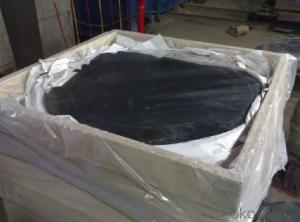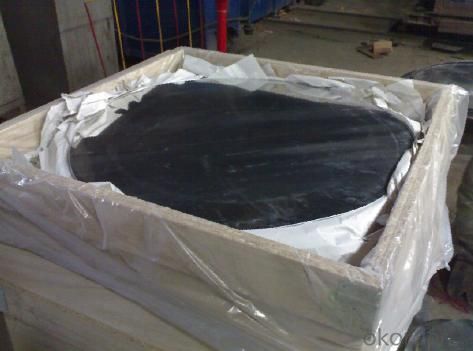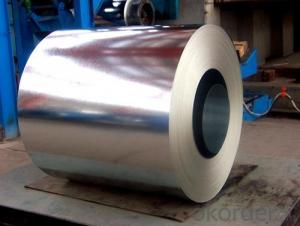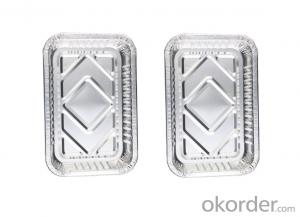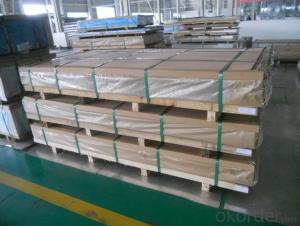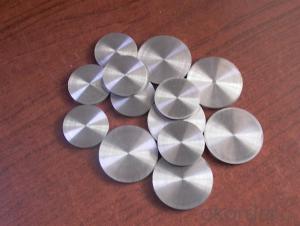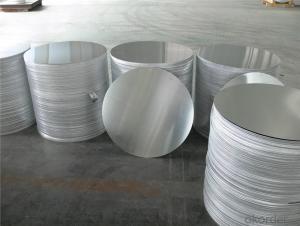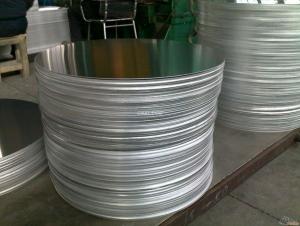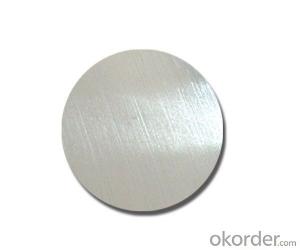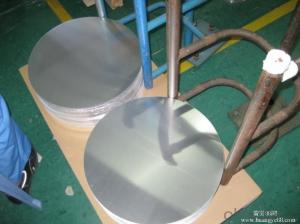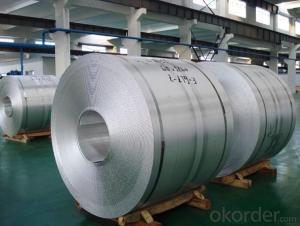Denver Aluminum Sheets - Continuous Casting Aluminum Circle for Spinning
- Loading Port:
- Shanghai
- Payment Terms:
- TT OR LC
- Min Order Qty:
- 2 m.t.
- Supply Capability:
- 2000 m.t./month
OKorder Service Pledge
OKorder Financial Service
You Might Also Like
Specification
1.Structure of Continuous Casting Aluminium Circle for Spinning
Continuous Casting Aluminium Circle for Spinning is one semi-finished aluminium material. Aluminium Circle is widly used cookware, for example, aluminium pot, aluminium pan, aluminium cup ect. Our aluminium circle are widly exported to African market. We export more than 2000 tons every month. We can assure the breakage rate below 5%. Extra breakage will be responsible by our company.
2. Main features of Continuous Casting Aluminium Circle for Spinning
a.Competitive price---We have our own mills and can produce mill finished aluminium coils, so we can control the production cost better.
b.Professional after-sale service---We have more than 15 years exportation experience and you need not worry about the exporation problems.
c.Fast delivery time---We can control the delivery time within 35 days.
3. Image
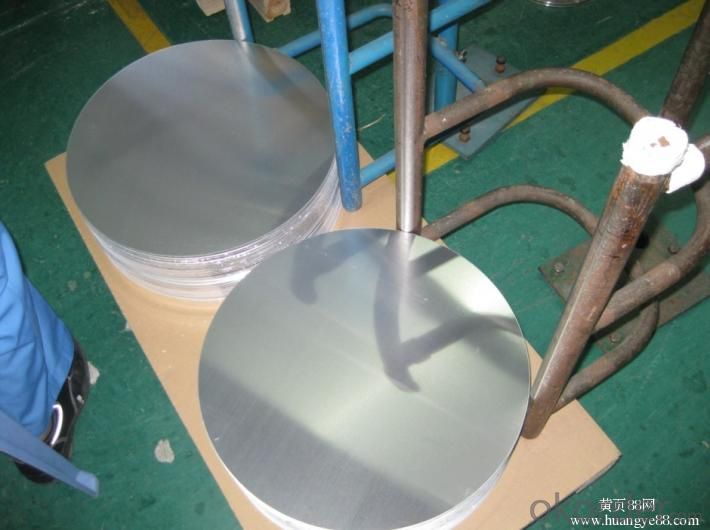
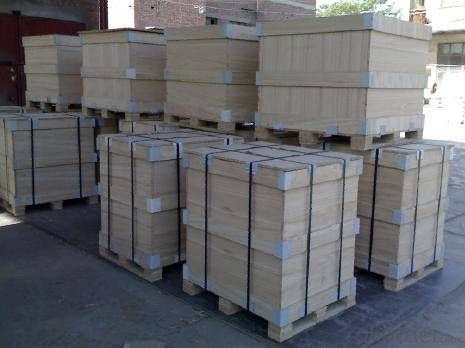
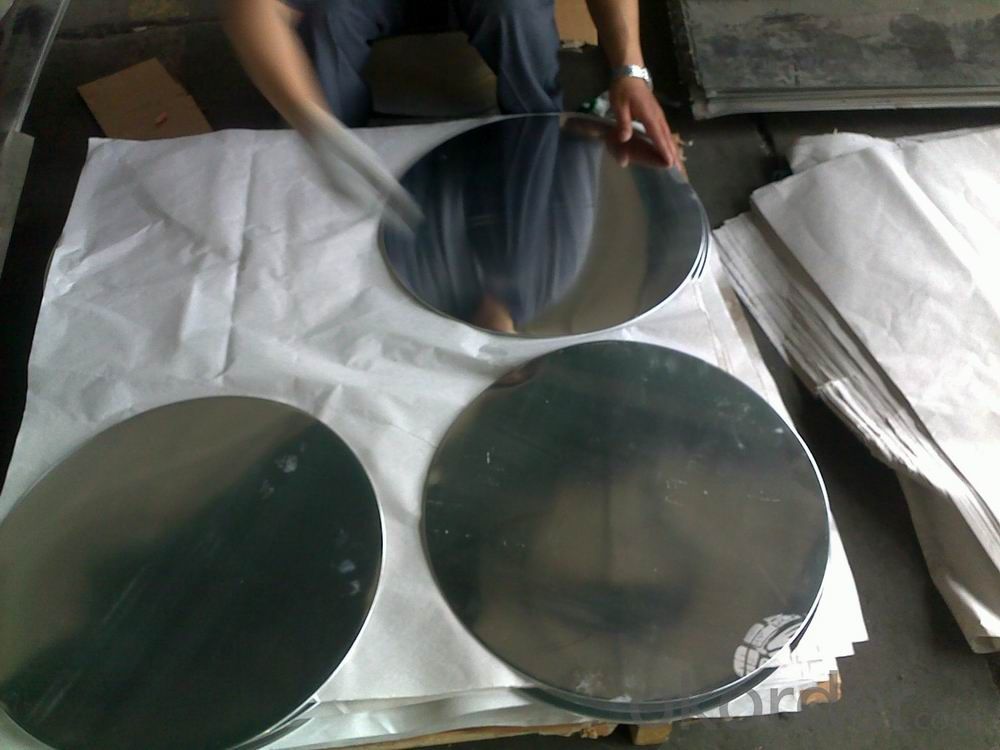
4. Product Specification
| Alloy | Thickness | Diameter | Weight | Style |
| AA1100 | 0.2MM-2MM | 100MM-1000MM | 2 TONS | Spinning |
5.FAQ:
What is the quality standard?
---Usually our standard is GB3880-2006
What is the largest width?
---It is 2300mm
What is the MOQ?
---Usually we can accept 2 tons.
- Q: This question asks for a list of various coatings that can be applied to aluminum sheets for different purposes.
- <p>Aluminum sheets can be coated with a variety of materials to enhance their properties such as durability, appearance, and corrosion resistance. Some common types of coatings include: 1. Anodizing: Creates a protective oxide layer on the aluminum surface. 2. Powder Coating: A dry coating that is electrostatically applied and then cured at high temperatures. 3. PVDF (Polyvinylidene Fluoride) Coating: Known for its excellent resistance to UV, chemicals, and weathering. 4. Epoxy Coating: Provides a hard, durable finish that is resistant to chemicals and corrosion. 5. Polyester Coating: Offers good adhesion and is often used for outdoor applications. 6. Fluorocarbon Coating: Provides a high level of durability and resistance to weathering. 7. Ceramic Coating: A newer type of coating that offers excellent heat resistance and a smooth finish. These coatings are chosen based on the specific requirements of the application, such as architectural, automotive, or aerospace uses.</p>
- Q: How do aluminum sheets perform in terms of sound insulation?
- Aluminum sheets are not effective in terms of sound insulation due to their low mass and high density, which allows sound waves to easily pass through them.
- Q: Are aluminum sheets suitable for decorative purposes?
- Yes, aluminum sheets are suitable for decorative purposes. Aluminum is a versatile material that can be easily manipulated into various shapes and designs, making it ideal for decorative applications. It can be cut, bent, and formed into different patterns, allowing for endless possibilities in creating decorative elements. Additionally, aluminum sheets can be coated or painted in different colors and finishes to further enhance their aesthetic appeal. Furthermore, aluminum is a lightweight and durable material, which makes it suitable for both indoor and outdoor decorative use. It is resistant to corrosion, ensuring that the decorative elements made from aluminum will retain their appearance and last for a long time. Overall, aluminum sheets offer a wide range of design possibilities and practical benefits, making them an excellent choice for decorative purposes.
- Q: What are the common uses of aluminum sheets?
- Aluminum sheets possess excellent properties, rendering them highly versatile and extensively utilized across various industries. Their applications encompass: 1. Construction: In the construction industry, aluminum sheets find common usage for roofing, siding, and insulation purposes. Their lightweight nature, durability, and resistance to corrosion make them ideal for shielding against the elements. 2. Transportation: The automotive and aerospace industries heavily rely on aluminum sheets. These sheets contribute to the manufacturing of car bodies, truck trailers, and aircraft parts owing to their impressive strength-to-weight ratio. Consequently, the utilization of aluminum sheets aids in enhancing fuel efficiency and reducing overall vehicle weight. 3. Packaging: Aluminum sheets serve as a popular choice for packaging purposes, specifically within the food and beverage industry. Cans, foils, and containers are frequently crafted from aluminum sheets, as they effectively safeguard packaged products by acting as barriers against moisture, light, and oxygen. 4. Electrical and Electronics: The electrical and electronics industry benefits from the application of aluminum sheets due to their exceptional conductivity. Their utilization extends to the manufacturing of electrical enclosures, heat sinks, and wiring, as they efficiently dissipate heat and protect delicate electronic components. 5. Marine Industry: Aluminum sheets hold significant value within the marine industry due to their resistance to corrosion. They are employed in the construction of boat hulls, ship fittings, and other marine equipment. The ability of aluminum sheets to withstand harsh marine environments, alongside their lightweight properties, renders them an appealing choice. 6. Decorative Applications: Architectural applications often feature aluminum sheets for their aesthetic appeal. These sheets can be effortlessly shaped, formed, and colored to create diverse decorative elements like wall cladding, ceilings, and decorative panels. In conclusion, aluminum sheets serve as a fundamental material across numerous industries, including construction, transportation, packaging, electrical and electronics, marine, and decorative applications. Their versatility and significance are evident in their widespread utilization throughout various sectors.
- Q: This question asks for an explanation of the various grades of aluminum sheets and the distinctions between them.
- <p>Aluminum sheets are categorized into different grades based on their alloy composition, which affects their properties such as strength, formability, and corrosion resistance. Common grades include 1000 series (99.00% aluminum, soft and malleable), 2000 series (aluminum-copper alloys, strong and heat treatable), 3000 series (aluminum-manganese alloys, good formability), 5000 series (aluminum-magnesium alloys, good strength and corrosion resistance), and 6000 series (aluminum-silicone-magnesium alloys, good strength and extrudability). Each grade has specific applications based on its characteristics, with 1000 series used for general purposes, 2000 series for aircraft structures, 3000 series for decorative applications, 5000 series for marine environments, and 6000 series for structural components.</p>
- Q: Can 101 aluminum sheets be bonded to other materials?
- Yes, 101 aluminum sheets can be bonded to other materials. Aluminum is a versatile material that can be bonded to a wide range of substrates using various bonding techniques. Some commonly used methods for bonding aluminum sheets to other materials include adhesive bonding, mechanical fastening, welding, and brazing. The specific bonding method chosen would depend on factors such as the type of material being bonded to the aluminum, the desired strength of the bond, and the intended application. However, it is important to ensure compatibility between the aluminum sheets and the other materials to ensure a strong and durable bond.
- Q: Which kind of glue can bond two pieces of aluminum sheets?
- You can use AB glue.
- Q: I may use the copper or brass for an inlay on a decorative piece of aluminum I'm working on.....
- This Site Might Help You. RE: which has the lower melting temperature....aluminum, copper, or brass...can you list all 3? I may use the copper or brass for an inlay on a decorative piece of aluminum I'm working on.....
- Q: What are the different types of surface treatments available for painted aluminum sheets?
- Painted aluminum sheets can undergo a variety of surface treatments to enhance their appearance, durability, and protection against corrosion and damage. Anodizing is a commonly used surface treatment where aluminum sheets are immersed in an electrolytic solution and an electric current is passed through them. This process forms a protective oxide layer on the surface, improving corrosion resistance and providing a base for painting or other decorative finishes. Another popular treatment is powder coating, which involves applying a dry powder to the aluminum's surface and then heating it to create a tough, protective layer. This coating is known for its durability, resistance to fading and chipping, and ability to offer a wide range of colors and finishes. Apart from anodizing and powder coating, there are other surface treatments available for painted aluminum sheets. Chemical conversion coating entails applying a chemical solution to create a protective layer, while laminate coatings involve adding a thin film or laminate for additional protection and decoration. In conclusion, the various surface treatments for painted aluminum sheets provide several advantages, such as improved appearance, durability, and corrosion resistance. The choice of treatment depends on the specific requirements and desired outcomes for the aluminum sheets.
- Q: What is the typical torsional strength of aluminum sheets?
- The torsional strength of aluminum sheets can vary depending on factors such as alloy composition, thickness, and manufacturing process. However, aluminum sheets generally have good torsional strength compared to other materials. Commonly used aluminum alloys in sheet form, like 6061-T6 and 5052-H32, have torsional strengths ranging from approximately 22,000 to 40,000 psi. These values indicate the maximum torque the aluminum sheet can withstand before permanent deformation or fracturing. Torsional strength is just one aspect of aluminum sheet's overall mechanical properties. Tensile strength, yield strength, and elongation are other important factors in determining the suitability of aluminum sheets for specific applications. When choosing aluminum sheets for a torsional application, it is crucial to consider specific requirements and consult with material suppliers or engineers to ensure the selected aluminum sheet meets the desired torsional strength criteria.
Send your message to us
Denver Aluminum Sheets - Continuous Casting Aluminum Circle for Spinning
- Loading Port:
- Shanghai
- Payment Terms:
- TT OR LC
- Min Order Qty:
- 2 m.t.
- Supply Capability:
- 2000 m.t./month
OKorder Service Pledge
OKorder Financial Service
Similar products
Hot products
Hot Searches
Related keywords
